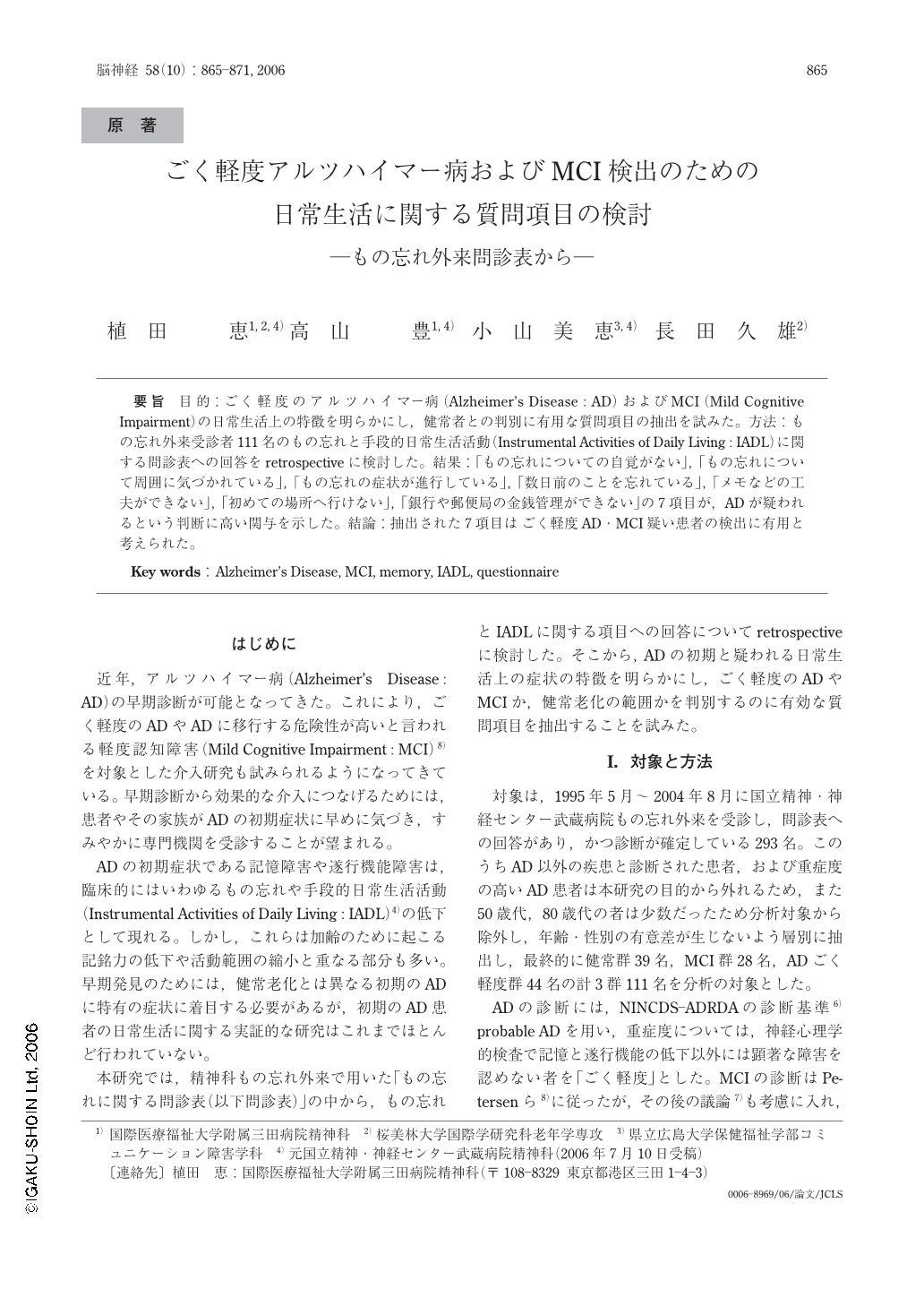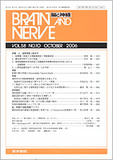Japanese
English
- 有料閲覧
- Abstract 文献概要
- 1ページ目 Look Inside
- 参考文献 Reference
要旨 目的:ごく軽度のアルツハイマー病(Alzheimer's Disease : AD)およびMCI(Mild Cognitive Impairment)の日常生活上の特徴を明らかにし,健常者との判別に有用な質問項目の抽出を試みた。方法:もの忘れ外来受診者 111名のもの忘れと手段的日常生活活動(Instrumental Activities of Daily Living : IADL)に関する問診表への回答をretrospectiveに検討した。結果:「もの忘れについての自覚がない」,「もの忘れについて周囲に気づかれている」,「もの忘れの症状が進行している」,「数日前のことを忘れている」,「メモなどの工夫ができない」,「初めての場所へ行けない」,「銀行や郵便局の金銭管理ができない」の7項目が,ADが疑われるという判断に高い関与を示した。結論:抽出された7項目は ごく軽度AD・ MCI疑い患者の検出に有用と考えられた。
Background and Purpose : There have been very few studies trying to explain about daily life features of patients with very mild Alzheimer disease (AD) and of those with mild cognitive impairment (MCI). The purpose of this study was 1) to clarify characteristics of very mild AD and MCI in their daily life, and 2) to examine items in a questionnaire that can be useful for detecting subjects of suspected AD. Subjects and Methods : Subjects were 111 patients of the memory clinic in National Center Hospital for Mental, Nervous, and Muscular Disorders, National Center of Neurology and Psychiatry, Japan; 39 normal range, 28 MCI, and 44 very mild AD. On their first visits, they were asked to fill out a questionnaire consisted of 103 items. Thirty five items in a questionnaire were selected, 15 memory-complaint items and 20 items of instrumental activities of daily living (IADL), and examined retrospectively. At first we compared each set of groups using the chi-square test. Then a logistic regression analysis was used to observe which items contributed to judge a person to be suspected of AD. And further, sensitivity and specificity for discriminating between an AD suspected and a normal range were examined. Results : None of the items showed statistical significance between MCI group and very mild AD group. Then, we combined these two groups into one group (n=72), and made comparison between this new group and normal range group (n=39). There were 18 items that showed statistical significance between the two groups. And five of them,‘dysfunction of memory : noticed by others’,‘dysfunction of memory : getting worse’,‘unable to utilize the memorandum’,‘forget incidents occurred a few days ago’ and ‘unable to locate unfamiliar places’ showed significantly high odds ratio in judgment on a person to be suspected of AD. In addition to preceding 5 items we adopted two items,‘dysfunction of memory : unnoticeable by her/himself’ and ‘unable to manage household expenses’, which were not included in the logistic regression analysis, but were essential for the discrimination between the two groups. The sum of score of these 7 items showed high specificity and sensitivity for dividing between the two groups. Conclusion : These findings indicated that an exploration of memory complaints and deteriorations of IADL was useful for the detection of MCI and very mild AD, especially 7 items described above could be used as a simple questionnaire for the elderly.

Copyright © 2006, Igaku-Shoin Ltd. All rights reserved.


